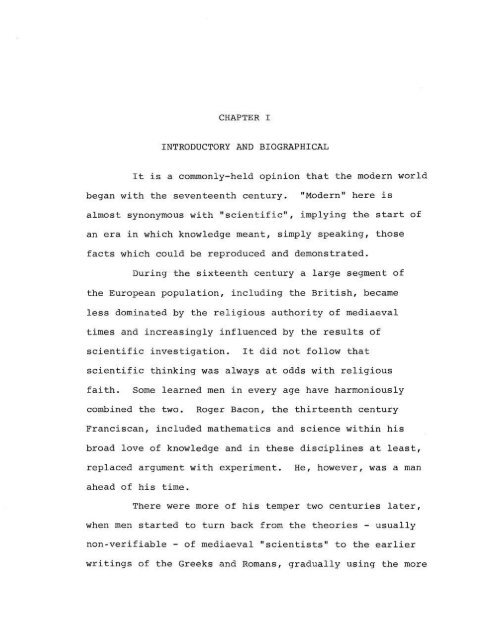- Page 5 and 6: THE SCIENTIFIC ENGLISH PROSE OF WIL
- Page 7 and 8: his knowledge of the works of ancie
- Page 9 and 10: ACKNOWLEDGEMENTS LIST OF ABBREVIATI
- Page 12 and 13: DEPARTURES FROM THE TEXTS Quotation
- Page 17 and 18: Of the subject ....hich ....as to b
- Page 21: how when on holiday in Norfolk, he
- Page 26: 13 remainder of his life. On leavin
- Page 29: Whilst at Sion House, Turner was ex
- Page 32 and 33: "heat" of each plant and this will
- Page 35 and 36: Jackson recounts from Strype the st
- Page 37 and 38: when a fellow in Cambridge, Turner
- Page 39 and 40: he was hindered by the conventional
- Page 41: Turner's ilse of the vernacular,. I
- Page 45 and 46: in Facsimiles, p. 33). One is tempt
- Page 47 and 48: Turner's attitude to authorities, a
- Page 49: and the pores. They make dull all t
- Page 53: Kitely, a compulsive neurotic riddl
- Page 59 and 60: melancholic disposition. This would
- Page 62 and 63: that when taken with a meal it shou
- Page 64 and 65:
In the Epistle to the book of wines
- Page 66 and 67:
since this chemical analysis was no
- Page 68:
white wines to be even as binding a
- Page 71 and 72:
cool and notably drye" (ibid. fo1 9
- Page 73 and 74:
"heate mu:ne membres that are found
- Page 75:
into anye bath" (ibid. fol. 14 v )
- Page 78 and 79:
stronger force of attraction existe
- Page 81 and 82:
and that the fanciful spotted leaf/
- Page 84:
perching unharmed by the mouth of t
- Page 87:
to the holes in the leaves, no reli
- Page 91 and 92:
sceptical of transmutation. Harriso
- Page 94 and 95:
shall see whether the iuyce of thos
- Page 96 and 97:
sylver, to a gentleman in the stede
- Page 98 and 99:
and gone out of kynde, and are also
- Page 100:
idolatry. Turner equates the spirit
- Page 104 and 105:
CHAPTER III THE ELEMENTS OF TURNER'
- Page 106 and 107:
"more easy and more plain to know a
- Page 109 and 110:
cultivated a plainer written style,
- Page 111 and 112:
98 Ascham's opinions on English pro
- Page 114:
sig.'7T' 3 v ). There follows an al
- Page 117 and 118:
people. ,,17 A niewe herball, the w
- Page 120 and 121:
old beliefs concerning the magical
- Page 125 and 126:
maintained its popularity, for late
- Page 127 and 128:
flowers, seeds, roots - made on the
- Page 130 and 131:
He is correct in saying this is "th
- Page 136:
123 "The Germans call the Cawislip
- Page 139 and 140:
seene it. The comon Ciche hath a ve
- Page 141:
128 they start out like field clove
- Page 144 and 145:
sleyrny and full of a sleperynuce"
- Page 146 and 147:
(ibid., p. 171), and earlier in the
- Page 148 and 149:
long stalke very round leves, almos
- Page 150:
knowledge of a plant as complete. A
- Page 153 and 154:
(p. 73); and that the second kind o
- Page 155 and 156:
in the case of Butter Burre, whose
- Page 157 and 158:
with comparing the leaves of the Ge
- Page 159 and 160:
is obviously important to his argum
- Page 162 and 163:
He describes the plant with economy
- Page 164 and 165:
to which in fact, he is making furt
- Page 167 and 168:
herbal had done. This may have been
- Page 170 and 171:
p. 63); that Butter-bur is "called
- Page 172:
159 now called Bitter Vetch "becaus
- Page 177 and 178:
164 and that the Common Calamint "s
- Page 181 and 182:
Another plant for which Turner cons
- Page 183 and 184:
it to a four-leaved clover, this ad
- Page 188:
it claspeth aboute what so ever str
- Page 192:
"azured": "of a blew colour, so cle
- Page 198 and 199:
applications of their disciplines (
- Page 201 and 202:
through the body, instead of moving
- Page 203:
190 between Benjamin Franklin (elec
- Page 207 and 208:
good and strange herbes which I nev
- Page 211 and 212:
Dr. Ent was to prepare a dissection
- Page 213 and 214:
Nevertheless, after the time of the
- Page 215 and 216:
still ready to do the like in other
- Page 217 and 218:
of Lucerne as an English fodder cro
- Page 219 and 220:
independent of the old authors. Goo
- Page 221 and 222:
208 ....rote the Historia plantarum
- Page 224:
meaning. He advocated the determina
- Page 230 and 231:
microscope lenses to the Royal Soci
- Page 233:
who could read. Today an aspiring b

















